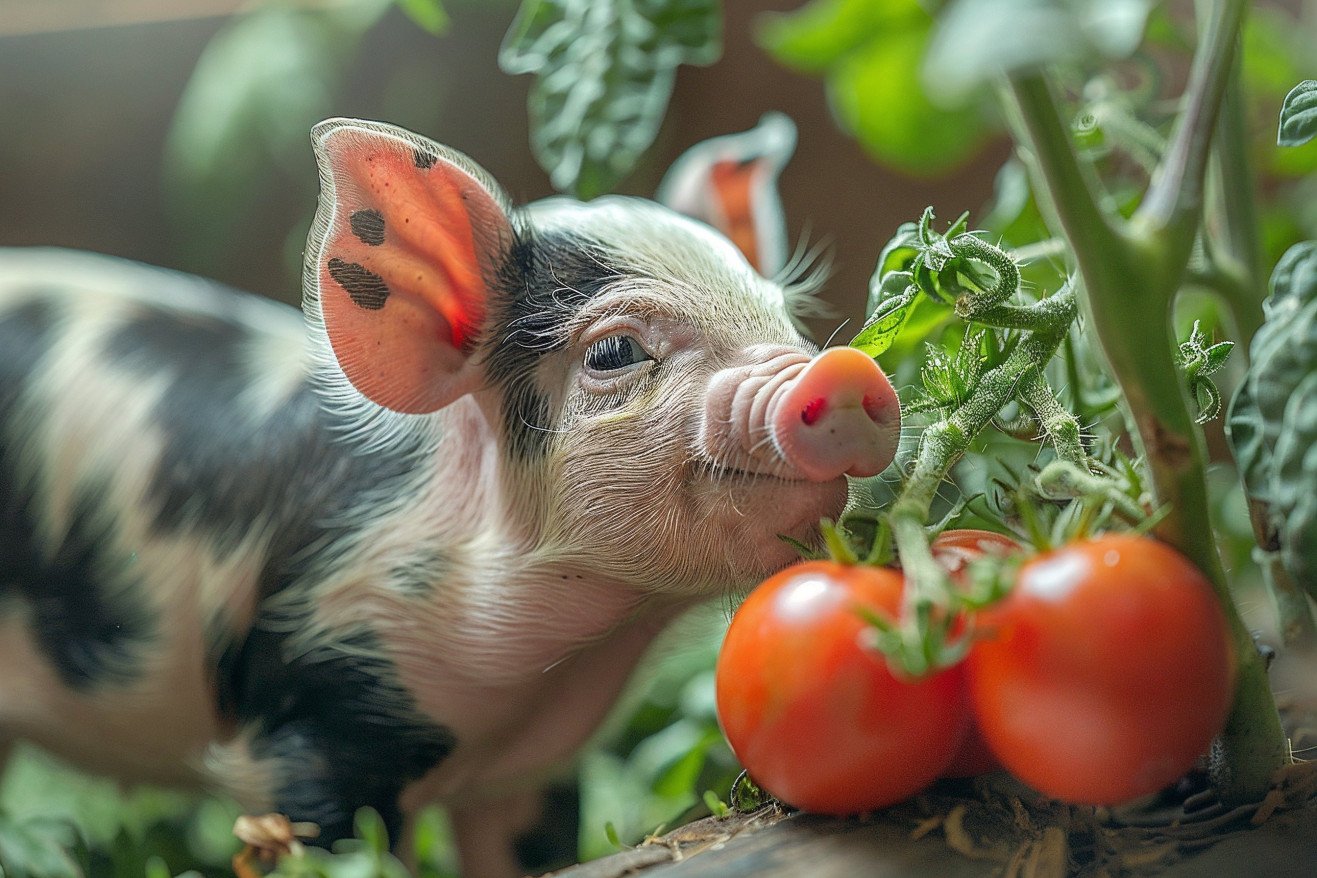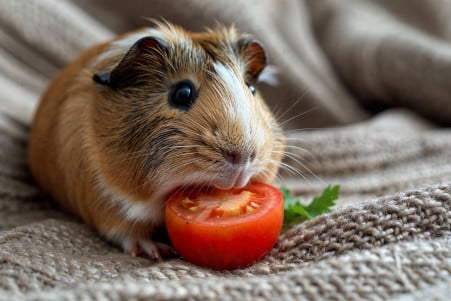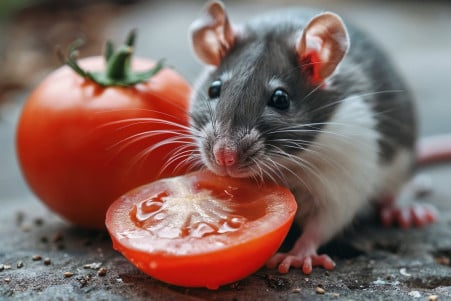Can Pigs Eat Tomatoes? A Nutritional Guide to This Fruit for Your Pig
17 May 2024 • Updated 15 May 2024

If you have a pet pig, you may be wondering if you can give them tomatoes, and the answer is a little more complicated than you might think when it comes to an omnivore's digestive system. Pigs can eat tomatoes in small amounts because they are not toxic to pigs. However, the tomato plant is a member of the nightshade family and contains solanine, which can be harmful to pigs if they eat too much of it.
This article will cover the latest veterinary studies and expert advice to help you understand exactly what you should and should not do when it comes to giving tomatoes to your pet pig. By exploring the plant-based diet of pigs, their digestive systems, and real-life experiences, you will learn how tomatoes and their nutrition can play a role in your pig's diet while avoiding any potential problems. This well-rounded view will help you make the best choices for your pig as a caring and informed pet owner.
Can pigs eat tomatoes?
Tomato Plant Safety: Risks to Be Aware Of
Unripe tomatoes, tomato plant vines, and tomato plant leaves should not be given to pigs because they contain solanine, a toxic compound. As noted by The Homesteading Hippy, solanine is found in every part of the tomato plant except for the ripe fruit, and feeding pigs these parts of the plant can result in serious health problems.
Consuming solanine can result in gastrointestinal issues, neurological symptoms, and even death in pigs if they eat too much of it, according to Gardening Know How. These symptoms can include vomiting, diarrhea, mouth irritation, and death.
To keep pigs safe, it's important to only give them ripe tomatoes and avoid giving them any other parts of the tomato plant. Texas Real Food also advises that pig owners should make sure to rotate grazing areas regularly and keep a close eye on their pig's diet to make sure they don't accidentally eat any toxic plants, including the tomato vine or leaves. By doing this, responsible pig owners can make sure that they can safely give their pigs the ripe tomato fruit without any negative side effects.
Portion Control: All Things in Moderation
While ripe tomatoes are fine for pigs to eat, it’s important to practice portion control to avoid potential problems. According to Nature's Best Organic Feeds, green tomatoes should be avoided, and tomatoes should not be overfed because they can lead to digestive upset.
Tomatoes should be introduced slowly and in small amounts, especially if a pig is not used to eating them. Countryside explains that while pigs will eat tomatoes, other vegetables are less likely to go to waste. A good rule of thumb from the American Mini Pig Association is to make sure tomatoes make up no more than 10-15% of a pig’s daily vegetable consumption. It’s important to watch how a pig responds to tomatoes and adjust the amount they are given accordingly to make sure they are not having any adverse effects.
Nutritional Benefits of Feeding Pigs Tomatoes
When fed to pigs in moderation, tomatoes can offer a range of nutritional benefits. As reported by Medical News Today, tomatoes are high in vitamins A, C, and K, as well as potassium and fiber. They also contain lycopene, an antioxidant that has been shown to have potential health benefits for pigs.
In particular, recent research has shown that tomatoes can have a positive impact on the gut microbiome in pigs. One study in Microbiology Spectrum even demonstrated that the short-term consumption of tomatoes led to increased microbial diversity and a shift in the gut microbiota to a more favorable composition in young pigs. Meanwhile, a study from Ohio State University found that the microbiomes of pigs that were fed tomatoes changed the ratio of "good" and "bad" bacteria.
That said, more research is necessary to determine the exact ways in which tomatoes impact pig health and the long-term effects of their consumption, as explained by Nutrition Insight.
How to Safely Introduce and Prepare
When introducing tomatoes to a pig's diet, it's important to do so in small amounts and to watch the pig for any adverse reactions. The Open Sanctuary Project suggests increasing the amount of tomatoes slowly over time to give the pig's digestive system time to get used to the new food.
Fresh, ripe tomatoes are always the best option, while canned and processed tomatoes should be avoided because of their high sodium content, which can be toxic to pigs according to The Open Sanctuary Project. Make sure to wash the tomatoes and remove any stems or leaves before giving them to your pigs.
To make sure your pigs are getting a well-rounded diet, you can mix tomatoes in with a variety of other vegetables in a salad, as recommended by the American Mini Pig Association. This will help ensure that your pigs are getting all of the nutrients they need from their food.
Conclusion: Tomatoes as a Safe and Nutritious Treat
In fact, recent studies have shown that a high-tomato diet can be beneficial for pigs. A study by Ohio State researchers found that after just two weeks of a high-tomato diet, the gut microbiomes of young pigs were more diverse and the bacteria in their guts were more favorable.
The researchers also found that the pigs that ate the tomatoes had a higher ratio of the phyla Bacteroidota to Bacillota, which is associated with better health outcomes. This means that feeding pigs tomatoes could have a positive impact on their gut microbiome.
That said, it's important to note that, according to Countryside, pigs should never be fed green tomatoes because they contain the toxic compound solanine. In addition, the Homesteading Hippy warns that tomato plant vines and leaves are high in solanine and can cause serious health issues in pigs.
By following the advice of experts and paying attention to their pig's response, pig owners can make sure that they're feeding their pigs tomatoes safely. Future studies may reveal more benefits or drawbacks to pigs eating tomatoes.


